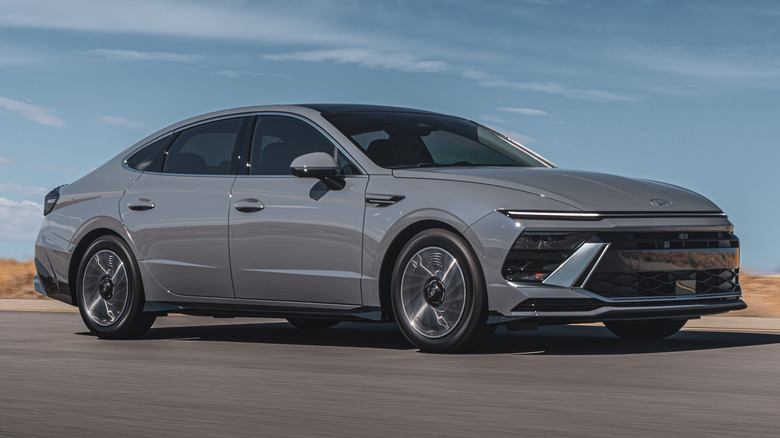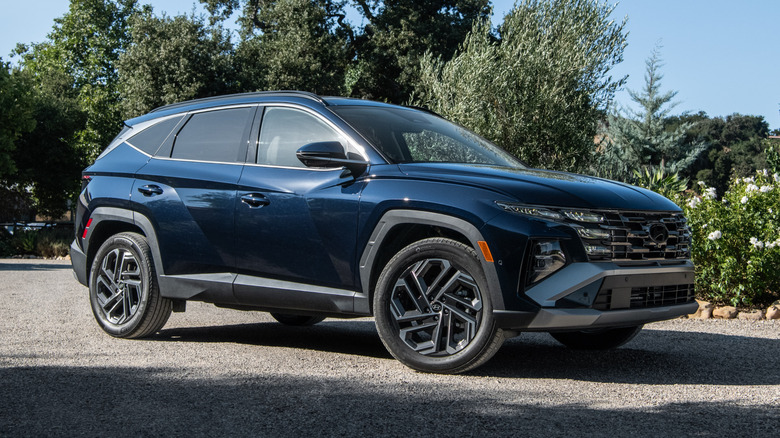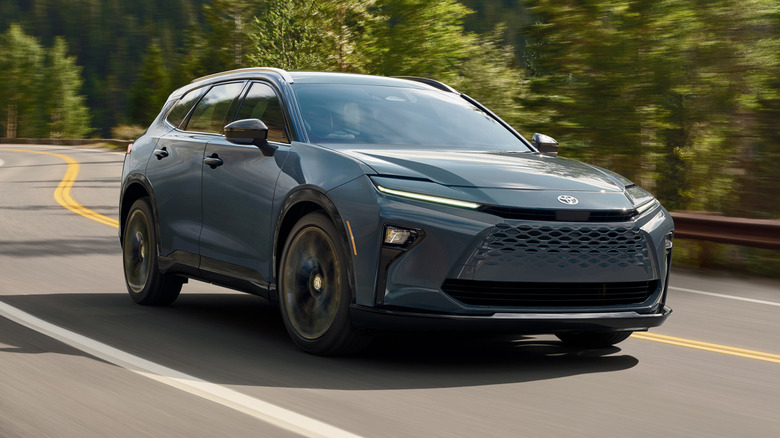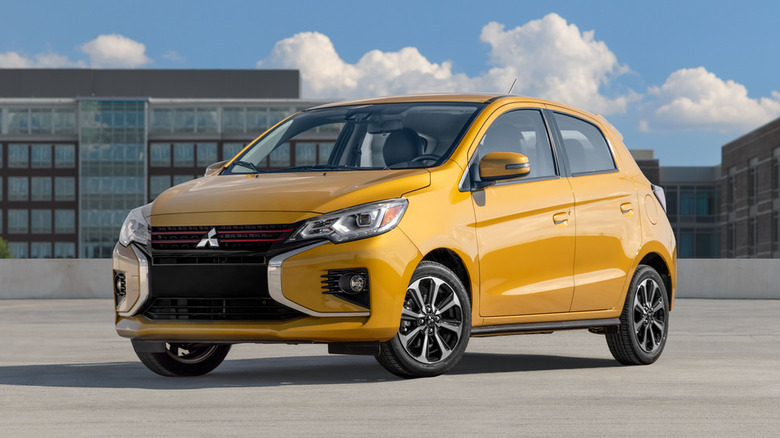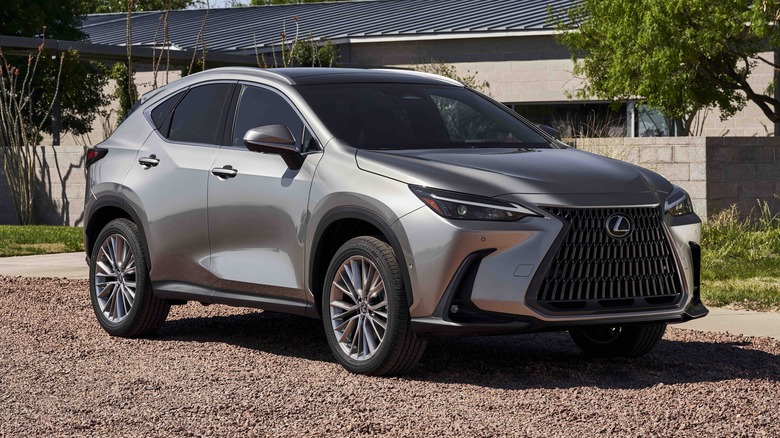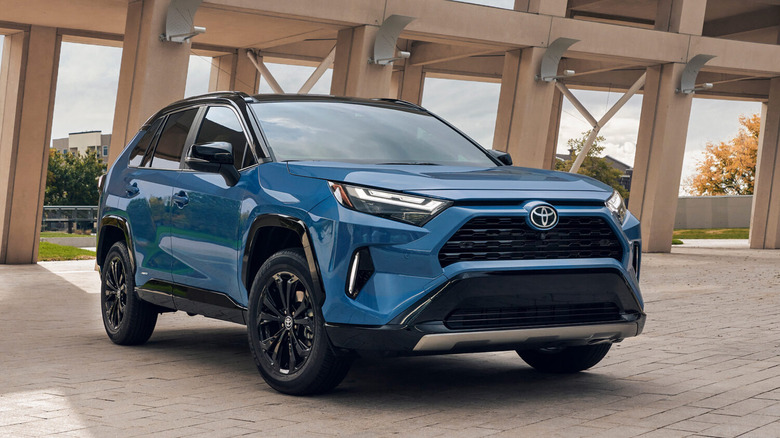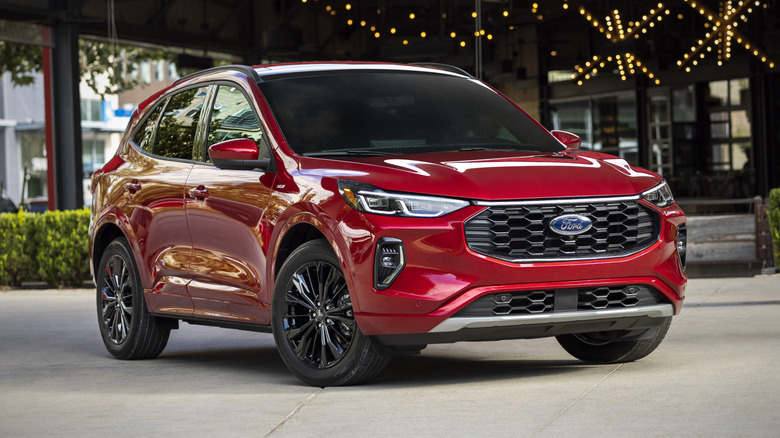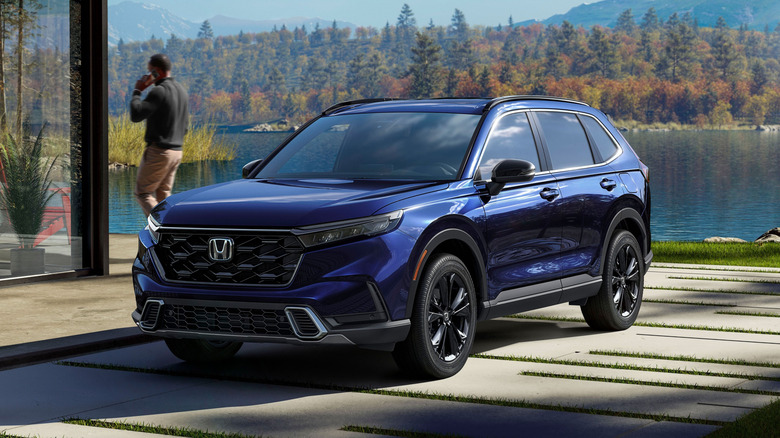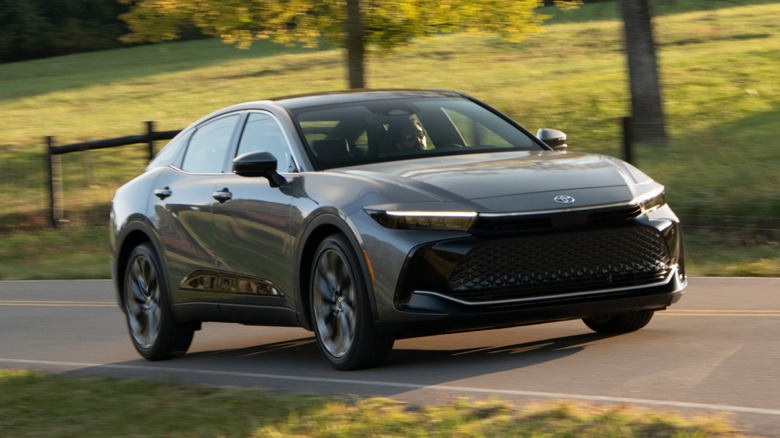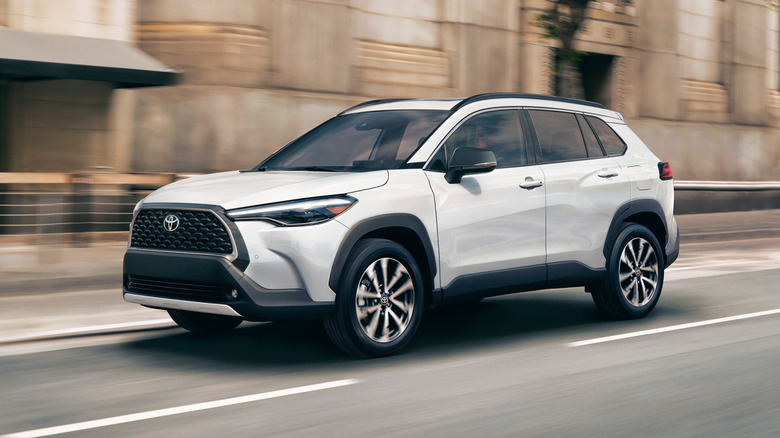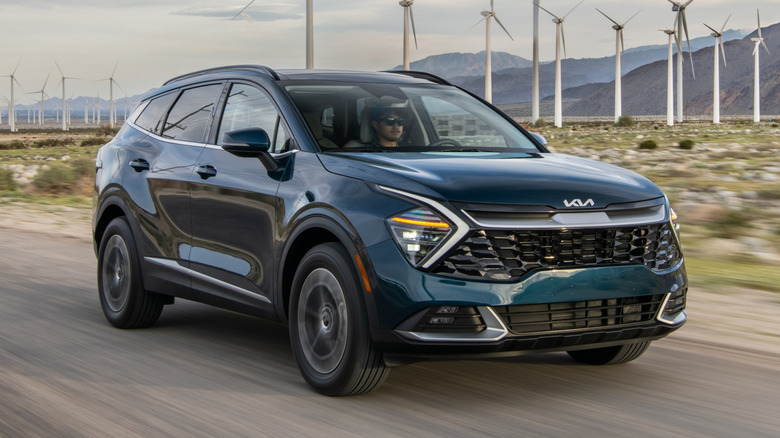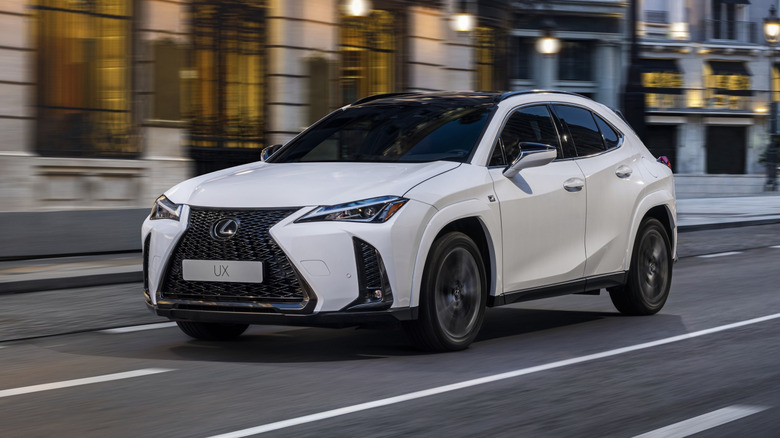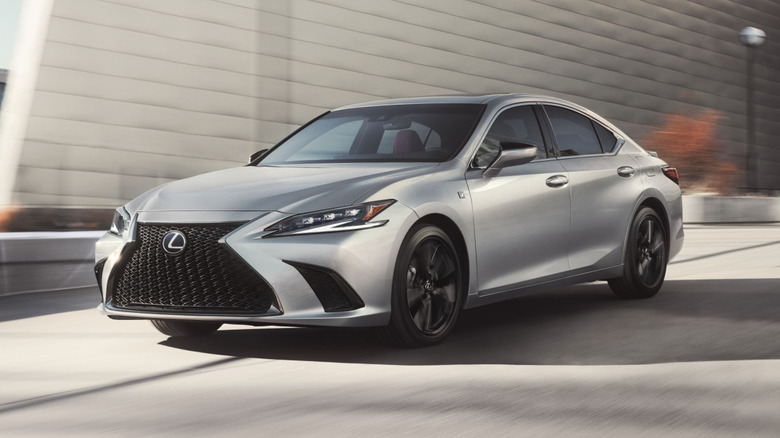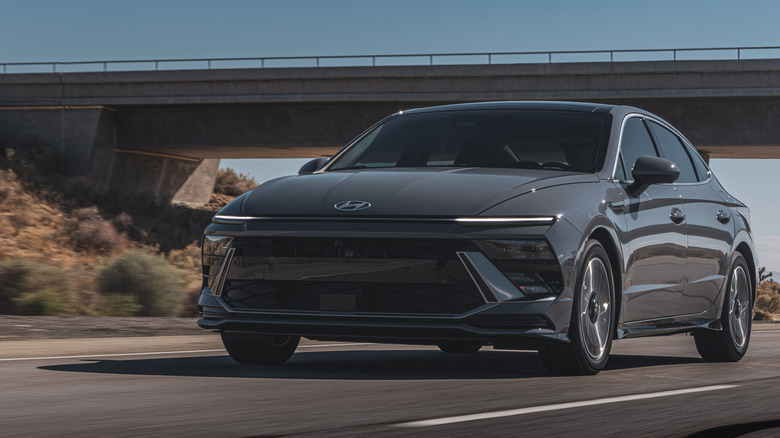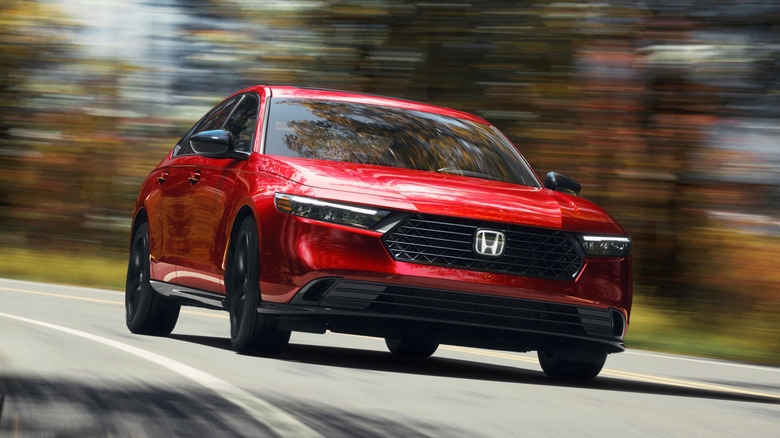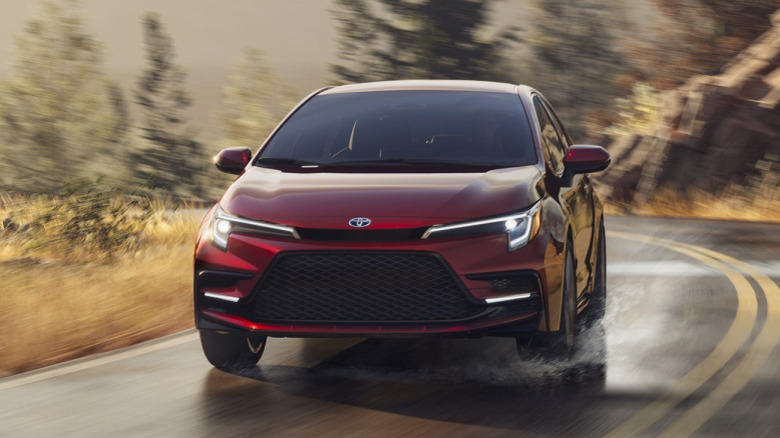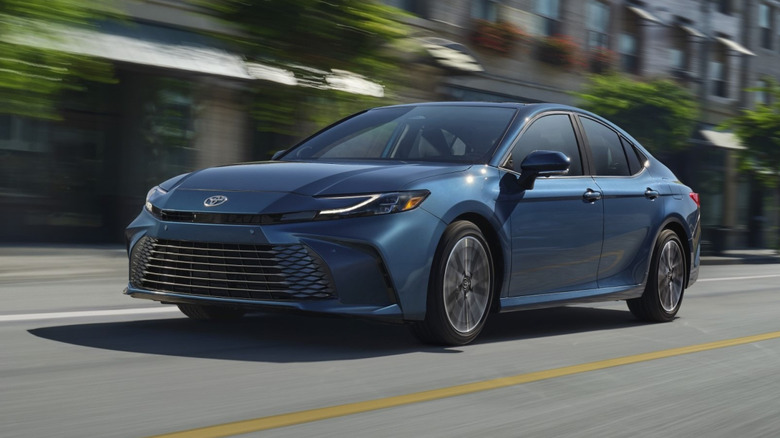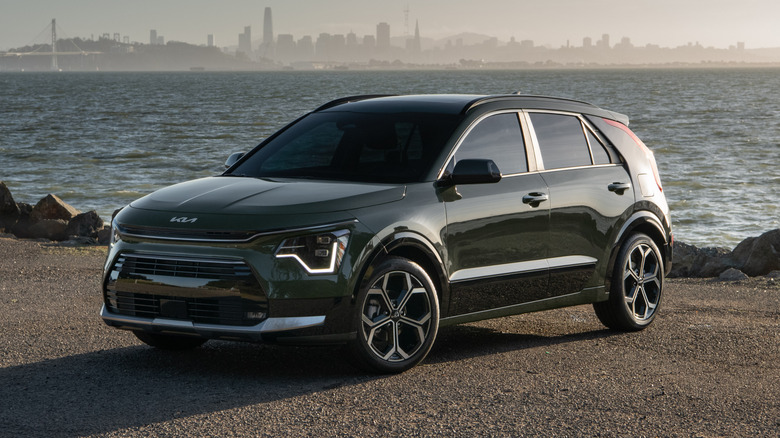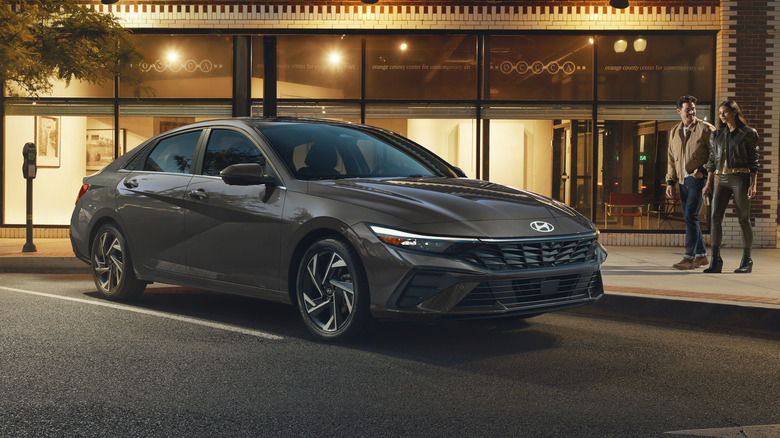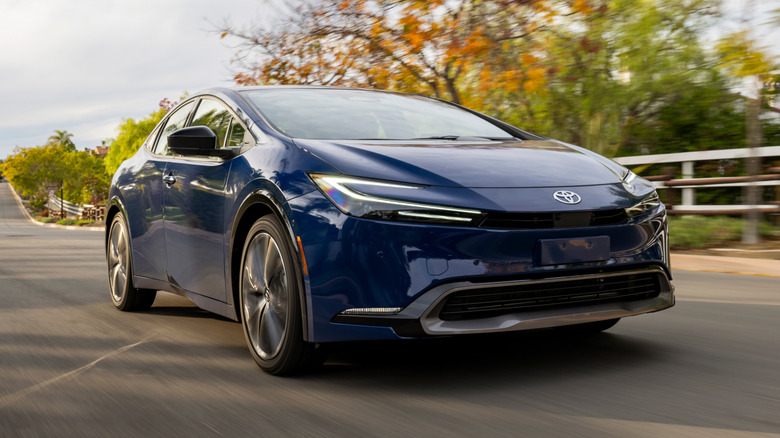The 20 Most Fuel Efficient Cars You Can Buy In 2025
According to a report published by the U.S. Energy Information Administration (EIA), the average retail price for a gallon of standard gasoline was $3.30 in 2024. That's marginally lower than the previous year, but still significantly higher than prices seen earlier in the decade. With continuing geopolitical uncertainty and stubborn inflation, there's little to indicate that gas prices will be dropping significantly any time soon, which makes buying an economical car more important than ever.
As well as saving money at the gas pump, buyers of highly economical gas cars get the satisfaction of knowing they're doing their bit to reduce their emissions footprint, without any of the hassle of using America's patchy charging infrastructure to top up an EV. These 20 cars are the most efficient on the market at the start of 2025 according to EPA data, and hail from a range of manufacturers. While the vast majority of included vehicles are mild hybrids, this list excludes plug-in hybrid vehicles and all-electric vehicles.
Hyundai Tucson Hybrid Blue — 38 mpg
The Hyndai Tucson received a fresh set of updates for the 2025 model year, with both exterior and interior changes. The cabin is subject to a design update that takes inspiration from the brand's electric models, and adds widely requested features like wireless Apple CarPlay and Android Auto.
The car's powertrains remain unchanged for 2025, with the most efficient Tucson Hybrid Blue trim sporting a 1.6-liter hybrid powertrain with a combined 231 hp output. A plug-in hybrid option is also offered, but because we're only including vehicles that do not require separate electric charging here, it's excluded from comparison. The Tucson Hybrid Blue will achieve 38 mpg combined according to EPA data.
Toyota Crown Signia — 38 mpg
The Crown is a long-running Toyota nameplate in Japan, but the automaker recently launched the latest iteration of the Crown in the U.S. too. It's available in both SUV and sedan form, with the SUV variant called the Crown Signia. It's pitched as a replacement to the Venza, but in our review of top-spec Toyota Crown Signia Limited trim, we found its cabin is a real step up.
Under the hood, the Crown Signia features a 2.5-liter four-cylinder hybrid powertrain that's shared with a number of other Toyota models (several of which make appearances further down this list). According to the EPA, the Crown Signia should achieve a combined 38 mpg, no mean feat considering its size and the fact that it comes with all-wheel drive as standard.
Mitsubishi Mirage — 39 mpg
It's easy to overlook the Mitsubishi Mirage. It's one of the least powerful new cars on the market, its interior is most kindly described as "budget-oriented," and its styling looks pretty dated. However, it does have some selling points beside its sub-$20,000 starting price. For starters, it's just about the most efficient gas-only car on the market, with its tiny 1.2-liter three-cylinder engine achieving a combined 39 mpg according to the EPA.
The Mirage's standard equipment list is also relatively generous given its meager price, and its five year or 60,000-mile warranty is also among the best in its segment. Unfortunately, Mitsubishi announced that it was axing the model after the 2024 model year, although, thanks to a backlog of existing inventory, it remains available to buy in dealerships as of January 2025.
Lexus NX 350h — 39 mpg
Lexus has cultivated a reputation as being one of the most sensible luxury car brands on the market, and that's not a bad thing. Its cars are consistent in delivering comfort, practicality, and efficiency in one neat package, and multiple Lexus models feature here as top performers for efficiency. When we reviewed the NX 350h, we were certainly impressed by its gas mileage, which reaches an average of 39 mpg combined, according to the EPA.
The NX acts as an affordable alternative to Lexus' bestselling RX crossover, while also being a step above the entry-level UX. It is also more efficient than the RX, although only by a small margin — the RX 350h delivers a still-impressive 36 mpg combined.
Toyota RAV4 Hybrid — 39 mpg
The Toyota RAV4 Hybrid remains a popular choice with buyers including SlashGear editor Adam Doud, who reviewed his own freshly-bought example in 2024. The family-friendly SUV packs a 2.5-liter four-cylinder hybrid powertrain under the hood, and according to the EPA, should return a combined average of 39 mpg.
As well as being efficient, the RAV4 Hybrid is also generously proportioned inside, well equipped even in lower trims, and benefits from Toyota's generous warranty package. It's far from the most exciting car to drive, although, with a handful of exceptions, strong fuel efficiency and exciting driving dynamics are mostly mutually exclusive in modern cars anyway.
Ford Escape Hybrid — 39 mpg
Ford's chief offering in the highly competitive compact SUV segment is the Escape, which has been a consistently strong seller for the brand. Part of that is down to its competitive efficiency figures, which sit at 39 mpg for 2025 according to the EPA. That figure relates to the Escape mild hybrid — the Blue Oval also offers a plug-in variant and multiple purely gas-powered versions too.
There's an Escape to cater to all types of buyers then, but for those looking for the best efficiency without the hassle of plugging in, the Escape Hybrid is the version to have. The 192 horsepower on tap means that it's no slouch either, despite its fuel-sipping credentials.
Honda CR-V — 40 mpg
The Honda CR-V is a popular choice among buyers looking for a family-friendly but reasonably priced SUV. Per the EPA, it will achieve an average of 40 mpg combined, enough to save buyers around $2,500 in fuel costs over five years compared to the average new car. Its 2.0-liter four-cylinder hybrid powertrain pushes out just north of 200 hp, but a cheaper, less powerful non-hybrid variant is also offered.
The car received a major overhaul for the 2023 model year, with everything from its exterior styling to its safety tech given an upgrade. Since then, changes for the model have been very minor, and the 2025 model is a carryover from the previous year.
Toyota Crown — 41 mpg
When we reviewed the Toyota Crown sedan, we found it to be the more efficient of the two Crown variants, beating its SUV sibling on mpg figures, although only just. The 2025 Crown achieves an EPA-certified 41 mpg combined, 3 mpg higher than the Crown Signia SUV. Both models share the same 2.5-liter four-cylinder hybrid powertrain, which churns out 236 hp in the Crown sedan.
The model also offers a more powerful Hybrid MAX powertrain, which generates a combined 340 hp, but the tradeoff is significantly lower efficiency. While the base-spec Crown is a top performer, the Hybrid MAX Crown is much less impressive, offering a combined 30 mpg.
Toyota Corolla Cross Hybrid — 42 mpg
After spending some time putting the Toyota Corolla Cross Hybrid through its paces, SlashGear's verdict was a mixed one. In isolation, Toyota's smallest crossover was a decent offering, although it felt noticeably cheaper inside than many of its contemporaries. Its 2.0-liter four-cylinder hybrid powertrain was also annoyingly noisy during higher speed driving.
Its EPA-estimated 42 mpg combined remains high for its segment, but it's a way short of what the most frugal Toyota models can offer. In fact, several roomier, similarly priced models are available to buyers within Toyota's dealerships, making the Corolla Cross Hybrid tricky to recommend on numbers alone.
Kia Sportage Hybrid — 43 mpg
According to data from CarFigures, Kia sold 261,917 examples of its Sportage across 2024. That is a big increase from previous years, and reflects the fact that Kia keeps tweaking its bestselling SUV to make it ever more appealing each year. The South Korean brand recently unveiled its upcoming 2026 Sportage, complete with yet more significant updates, but as of this writing, it's not yet available to order.
Still, the 2025 Sportage remains impressive, with its EPA-quoted 43 mpg combined making it the most efficient SUV in its segment. To reach that figure, buyers will have to sacrifice all-wheel drive and opt for the 1.6-liter four-cylinder hybrid powertrain.
Lexus UX 300h — 43 mpg
The smallest SUV in the Lexus range is the UX 300h. It's also one of the most efficient models that the Japanese automaker offers, with a combined rating of 43 mpg according to the EPA. It provides all the usual things that Lexus buyers will be looking for: comfort, build quality, and a smooth ride that's suitable for long-distance cruises or everyday grocery runs.
In our review of the F Sport Handling trim, reviewer Braden Carlsen also found the UX 300h to handle surprisingly well to boot. It's still no sports car, but it's one of the few models on the market where chasing exceptional efficiency doesn't have to mean compromising on driving fun.
Lexus ES 300h — 44 mpg
The most efficient Lexus model in the brand's current lineup — at least, excluding plug-in hybrids and BEVs — is the 2025 Lexus ES 300h. The sedan can manage an average of 44 mpg combined according to the EPA, putting it significantly ahead of most other luxury sedans on the market. To be fair, that market is a shrinking one, as SUVs and crossovers keep becoming more popular every year.
Still, it's notable that none of the ES' German rivals appear anywhere on the efficiency top performers list. For anyone who's looking for the optimal mix of comfort and frugality from their premium sedan, the ES 300h and its 2.5-liter four-cylinder hybrid powertrain is the one to have. Just don't expect handling characteristics on par with the best German sedans.
Hyundai Sonata Hybrid — 47 mpg
Sedan buyers looking for high efficiency have multiple options across a range of price points, with the Hyundai Sonata Hybrid on the more affordable end of that range. The 2025 model year sees no significant changes from 2024, with its 2.0-liter four-cylinder hybrid powertrain being carried over unaltered.
That powertrain should achieve an officially quoted 47 mpg combined, enough to save buyers $3,250 on fuel over the course of five years compared to the average new vehicle. It gives the car an estimated maximum range of 620 miles, enabling the average driver to go more than a week in between gas station trips.
Honda Accord Hybrid — 48 mpg
We reviewed the Honda Accord Hybrid's current generation when it debuted in 2023. The nameplate has been around since 1976, and over the years it has become one of Honda's most recognizable models, staying popular with buyers even after rival sedans saw sales slump to unsustainable levels. In fact, data from CarFigures shows that Honda sold almost 150,000 examples of the Accord in the U.S. in 2024.
One key reason for that sustained popularity is the Accord's low running costs, particularly in its hybrid form. With its frugal 2.0-liter four-cylinder engine and dual electric motors, the Accord Hybrid will achieve 48 mpg combined, per EPA figures. That results in an estimated average annual fuel cost of $950 based on a mileage of 15,000 miles.
Honda Civic Hybrid — 49 mpg
Honda has been busy tweaking and refining the Civic to make it a more well-rounded package than ever, offering buyers a car that is simultaneously efficient, practical, affordable, and engaging to drive. The latest round of those tweaks debuted for the 2025 model year. Like virtually all 2025 models, the Civic offers drivers a freshly optimized suite of tech. There are also minor changes to the exterior and interior styling.
One key element of the Civic's appeal remains unchanged: its frugality. According to the EPA, the 2025 Civic Hybrid Hatchback's 2.0-liter four-cylinder hybrid powertrain will average 49 mpg combined.
Toyota Corolla Hybrid — 50 mpg
Another affordable Japanese hybrid is the Toyota Corolla Hybrid, which offers a combined 50 mpg rating according to EPA figures. Toyota hasn't majorly altered the format of the Corolla for years because it hasn't needed to. Its combined appeal of being practical, affordable, and frugal continues to pull in buyers regardless.
A 1.8-liter four-cylinder hybrid powertrain offering 138 hp is never going to make for a car that's exciting to drive, but at the Corolla Hybrid's price point, it doesn't need to be. Even the top-spec trim starts under $30,000, and the base trim is available for under $25,000, making for one of the most affordably efficiency performers in the brand's range. And this isn't even Toyota's most efficient model, either.
Toyota Camry Hybrid — 51 mpg
Even more efficient than the Corolla Hybrid is the Toyota Camry Hybrid, which starts at roughly $30,000 in base-spec form. Per the EPA, the Camry Hybrid should be able to achieve an average of 51 mpg combined, down slightly from 52 mpg for the 2024 model. Entering its ninth generation for 2025, the model sees notable changes including a new front end that shares some similarities with the Prius.
Inside, the car has been given a makeover too, with a new dash design and a revised range of upholstery options. Under the hood, Toyota's familiar 2.5-liter four-cylinder hybrid powertrain provides a respectable 225 horsepower.
Kia Niro FE — 53 mpg
The Kia Niro is available in both all-electric and fuel-burning forms for 2025, but both are very efficient. The car's 1.6-liter four-cylinder hybrid powertrain is good for an officially reported 53 mpg combined. That gives the car a maximum range of 588 miles between refuelling stops, even with its relatively modest 11 gallon fuel tank. Said tank should cost $33 to fuel up on average, per EPA estimates.
A plug-in hybrid variant of the Niro is also offered, and in theory, it's even more efficient than the regular hybrid. However, like all PHEVs, real-world efficiency will depend greatly on how often drivers use the all-electric range, and whether they keep the car charged up. Buyers in any doubt about whether they would use the all-electric range would likely be better suited by the regular hybrid, particularly given its segment-topping efficiency.
Hyundai Elantra Hybrid Blue — 54 mpg
While the Hyundai Elantra N is the clear winner for buyers looking for maximum driving thrills, its 24 mpg combined means it won't be scooping any prizes for efficiency. Leave that to its Hybrid Blue sibling, which utilizes a 1.6-liter four-cylinder hybrid powertrain to achieve an officially quoted 54 mpg.
Drivers who do an average of 15,000 miles per year will see the savings really start to add up with the Elantra Hybrid Blue, as the EPA estimates they will spend $3,750 less than drivers of the average new car over a five year period. Drivers who do most of their miles on the highway may well see even higher savings.
Toyota Prius — 58 mpg
The latest generation of the Toyota Prius debuted for the 2023 model year, and it represented something of a rebirth for the nameplate. The latest car's looks are a world away from all previous generations, being both sleek and, as it would turn out, previewing the design language since seen on a number of other Toyota models.
The basic formula has been carried over, however, and as we found in our review, the Prius is still a car for the driver who prioritizes efficiency over driving enjoyment. That efficiency is exceptional, with the EPA reporting an average of 58 mpg combined from the car's 2.0-liter four-cylinder hybrid powertrain. It might be better looking than before, but some things don't change — the Prius is still unbeatable when it comes to efficiency, assuming buyers don't want to make the step up to a plug-in hybrid EV.
